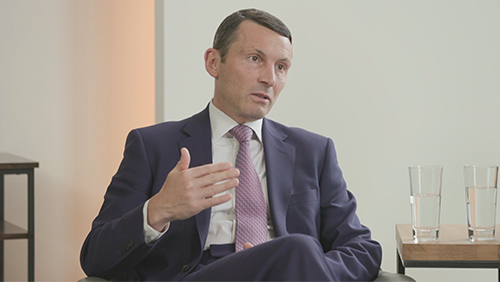March 2023
Article
Private pursuits: why Scottish Mortgage invests in unlisted companies
Tom Slater – Manager, Scottish Mortgage Investment Trust
Key Points
- Scottish Mortgage Investment Trust has made more than 80 private company investments since September 2012
- They give the Trust’s shareholders access to fast-growing, exceptional companies that are coming to market later than used to be the case
- Many of the deals come about via relationships built with company founders and venture capital investors

Illustration by Craig Frazier
Please remember that the value of an investment can fall and you may not get back the amount invested. This article originally featured in Baillie Gifford’s Autumn 2022 issue of Trust magazine.
Ten years ago, Scottish Mortgage made its first private company investment in Alibaba. The Chinese ecommerce business was embroiled in a dispute with Yahoo at the time. The US firm owned about 40 per cent of entrepreneur Jack Ma’s company and was unhappy with the way it had spun off its Alipay online payments division. But we believed Alibaba’s version of events and acquired part of Yahoo’s stake.
Back then, we didn’t know what we didn’t know: the skillsets and capabilities we needed to develop to invest beyond public stocks. But we saw an opportunity. There wasn’t much external interest in the deal. But that changed two years later when Alibaba celebrated the world’s largest stock market flotation, and news reports noted that our investments had grown from $50m to more than $250m in value.
I met Alibaba’s managers when they visited London before the listing. After attending a lunch with about 500 prospective investors, they travelled to our tiny office in the West End for further discussions. They did so because we’d supported them through a difficult time. This became a long-lasting relationship. We learned much. And it led to other private company opportunities, including an investment in digital payments specialist Ant Financial (now known as Ant Group), an offshoot from Alibaba.
Scottish Mortgage portfolio as at 30 June 2022
About 44% of the portfolio is invested in companies that were private at the point of first purchase


Source: Baillie Gifford. (Percentages are rounded to nearest whole number)
A decade on, we can invest up to 30 per cent of the value of the Trust, measured at the time of investment, in private companies at one time. But that figure underplays their true impact since we retain our stake in many after they go public.
In fact, we often take advantage of listings to increase our holding, unlike venture capital investors, who usually exit at that point. Generally, our philosophy is to back our winners. So where we see something work, our mindset is to put more capital behind it.
We work on the basis that if something goes wrong at a private company, we won’t be able to sell. But I don’t see investing in the sector as being riskier than in public stocks.
Firstly, Scottish Mortgage isn’t an ‘early-stage’ investor. By the point we get involved, businesses have already achieved reasonable success. Secondly, private companies benefit from being able to take a longer view. They have the freedom to make decisions that might depress near-term profits – such as heavily investing in research or infrastructure – and that will take years to pay off. That’s harder to do when dealing with short-term-focused shareholders and quarterly earnings reports.
Companies are staying private longer and building more value while unlisted

But that’s not the main reason we’re involved in the private markets: it’s to find companies engaged in activities we couldn’t get exposure to any other way. Scottish Mortgage’s focus is on making investments in companies with a purpose. These firms create value for society through the projects they undertake and the businesses they build, and have adaptable cultures that are often founder-run and undervalued by others. The ingredients we add are capital and a willingness to take on risk.
There’s risk because the projects’ outcomes are uncertain. But we believe payoffs for our shareholders will be attractive so long as some of our portfolio companies succeed. You can of course find publicly listed companies with a purpose. Being a long-term, supportive investor in Tesla, for example, has helped drive an industry-wide shift to electric vehicles (EVs).
But many game-changing companies are not publicly traded. Northvolt, for example, which makes EV batteries in factories powered by clean energy. Or Upside Foods, which is developing a way to grow meat directly from cells, avoiding the need to rear and slaughter animals.
Baillie Gifford’s relationships lead to further private company investments


Data is for Baillie Gifford as a whole over the course of 2021. Source: Baillie Gifford Private Companies Team.
A consequence of being later to list is that these companies achieve ever-higher valuations while private. We would miss out on this rapid growth stage if we limited Scottish Mortgage to public stocks.
Private companies get to pick their investors. That plays to our advantage. We benefit from being a large-scale trust, which allows us to write meaningfully large cheques. That suits startups, which only want a handful of investors involved in a funding round, not hundreds.
As an investment trust, Scottish Mortgage’s ‘closed-ended’ structure also means the pool of money my colleagues and I draw on isn’t affected by the purchase and sale of the Trust’s own shares. This gives investee companies confidence that we won’t be forced to a make a quick sale, which could affect their valuations.
By contrast, they see us as being a dependable partner that can help them make the sometimes tricky transition from private to public. Moreover, many private companies appreciate that we give retail investors an opportunity to share in their success and that we charge a relatively low fee for doing so.
Our reputation paves the way to further deals. Most of our private company investments stem from existing relationships or direct approaches. That often involves an introduction from a founder whose firm we previously backed or a referral from an early-stage investor we had previous dealings with. In my experience, these are nearly always higher-quality opportunities than ‘cold call’ approaches from investment banks and other third parties.
For example, the founders of the drone delivery firm Zipline knew their counterparts at the biotechnology company Solugen and put us in touch. Solugen picked us to become its biggest investor in a $350m funding round last year.
We always try to learn from the companies we invest in. And one of the benefits of being private is that companies feel more able to be open about what they disclose.
For instance, we took a holding in Thumbtack, a US online platform that helps you hire local help for home improvements and other services. It sent us a report split in two. One half said what was working well at the firm, the other what wasn’t. I challenge you to find a public company that would be so frank in an earnings result statement.
But ultimately, our work for the Trust is about trying to identify the small handful of companies that will be very big long-term winners. That’s what drives our shareholders’ returns. And by having the very best of the world’s private companies to select from, we increase the likelihood of success.
Scottish Mortgage’s first decade of private company investments
The size of each circle corresponds to the total amount invested in each company while private, as at 30 June 2022
Source: Baillie Gifford. The timeline has been compressed to remove periods when no investments were made.
Scottish Mortgage Annual Past Performance To 31 December each year (net %)
| 2019 | 2020 | 2021 | 2022 | 2023 | |
| Scottish Mortgage Investment Trust | 24.8 | 110.5 | 10.5 | -45.7 | 12.5 |
Source: Morningstar, share price, total return, sterling.
Past performance is not a guide to future returns.
About the author - Tom Slater
Manager, Scottish Mortgage Investment Trust
Tom Slater is manager of Scottish Mortgage Investment Trust and head of Baillie Gifford's US Equities Team. Tom's focus is on high-growth companies.
Investments with exposure to overseas securities can be affected by changing stock market conditions and currency exchange rates. The Trust has a significant investment in private companies. The Trust’s risk could be increased as these assets may be more difficult to sell, so changes in their prices may be greater.
The views expressed in this article should not be considered as advice or a recommendation to buy, sell or hold a particular investment. The article contains information and opinion on investments that does not constitute independent investment research, and is therefore not subject to the protections afforded to independent research.
Some of the views expressed are not necessarily those of Baillie Gifford. Investment markets and conditions can change rapidly, therefore the views expressed should not be taken as statements of fact nor should reliance be placed on them when making investment decisions.
Baillie Gifford & Co Limited is wholly owned by Baillie Gifford & Co. Both companies are authorised and regulated by the Financial Conduct Authority and are based at: Calton Square, 1 Greenside Row, Edinburgh EH1 3AN.
The investment trusts managed by Baillie Gifford & Co Limited are listed on the London Stock Exchange and are not authorised or regulated by the Financial Conduct Authority.
A Key Information Document is available by visiting bailliegifford.com










